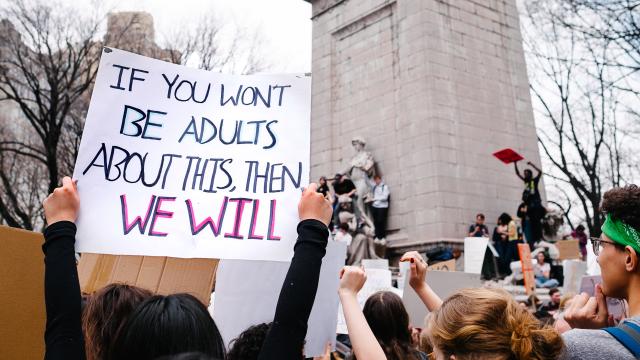Climate change is one the greatest intergenerational injustices. Decades of profligate carbon emissions by older generations have conscripted their children and grandchildren to a hotter, more dangerous world.
And the inaction of adults has ensured the world will need radical system change to avert the worst impacts of climate change.
A new analysis by Carbon Brief shows just how serious that system change will be by calculating the individual carbon budget available, generation by generation, to keep warming below 1.5 or 2 degrees Celsius.
It shows that a American child born in 2017 will have a lifetime carbon budget an nearly ten times lower than their grandparents’ if the world is to stave off catastrophic warming.
Beyond intergenerational justice, the results also highlight issues of equity between the developed and developing world.
The drumbeat of young adults clamoring for climate action has grown louder and louder in recent months.
Teens have led up for a Nobel Peace Prize.
The reason for the rapid escalation is simple. Young adults today are the first generation to grow up fully aware of how much previous generations’ emissions have altered the course of their lives.
“Our analysis shows why they are right to feel so aggrieved and angry at the generations currently in power,” Leo Hickman, Carbon Brief’s director, told Earther in an email.
The Carbon Brief analysis puts an academic spin on young peoples’ emotional appeals for climate action, one that could inform policy discussions. The world has a finite carbon budget to keep global warming to within 1.5 degrees Celsius. The analysis uses that knowledge as a jumping off point, showing by birth year how much of the budget each individual is allowed.
The result show that older generations—particularly in the developed world — blew through carbon like it was going out of style, leaving younger generations will the equivalent of pennies left to spend. Because developed countries have both higher overall and per capita emissions than most developing countries, their youngest citizens will have to emit a much smaller amount of carbon than their elders.
An average American boomer born in 1946, for example, has a lifetime carbon budget of 1551 tons. To keep warming within 1.5 degrees, their grandchildren born in 2017 will have a lifetime budget of 197 tons. The budget is substantially bigger with 2 degrees Celsius, but that will also come with tradeoffs like the likely loss of coral reefs and many small islands being rendered uninhabitable.
The numbers also assumes that Americans are entitled to a larger share of the carbon pie. And that assumption, of course, could be construed as bullshit. The 197 tons someone born in 2017 has is a far cry from their boomer grandparents, but it’s still vastly more than the 9 tons of carbon emissions allocated to a child born in the Philippines.
The Carbon Brief analysis also allows for an even split of the budget around the world, which would give each child born in 2017 a 124 ton allowance. That would involve steeper carbon emissions declines in the U.S. while allowing for more growth in developing countries.
This type of research has its limitations. The analysis itself notes emissions vary within countries, with the rich emitting vastly more carbon than the rest of us. And emissions in a place like China are also helping fuel American consumption, raising a question of who really “owns” them.
Nevertheless, the analysis still has a compelling story to tell. It shows that adults in power today have to start the course correction future generations will need. Carbon fuels everything now, but it can’t in the future.
“There is no avoiding the conclusion that these numbers suck for our children in the sense that they just can’t now have the fossil-fuelled lifestyles enjoyed by their parents and grandparents,” Hickman said. “However, it will largely be this coming generation who – by necessity – have to innovate, design and regulate their way to ensuring a safer climate for themselves and their own children.
Whether it’s AOC or Greta Thunberg, we are already beginning to see positive signs that future generations will have the drive, smarts and skills to pull this off.”
